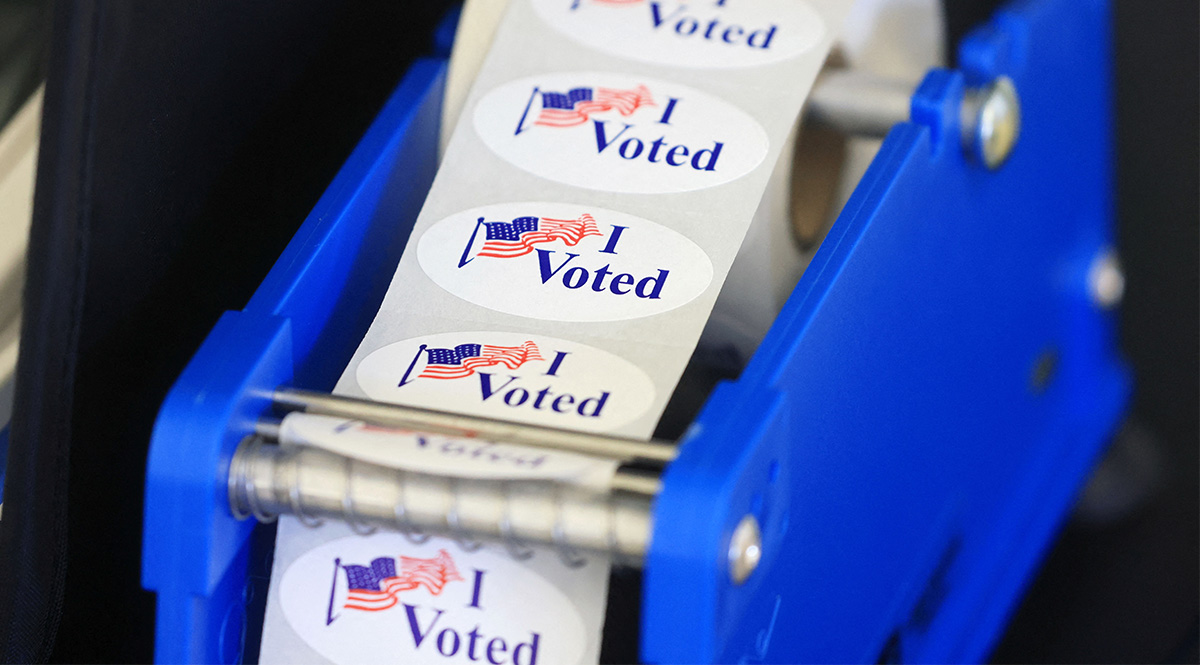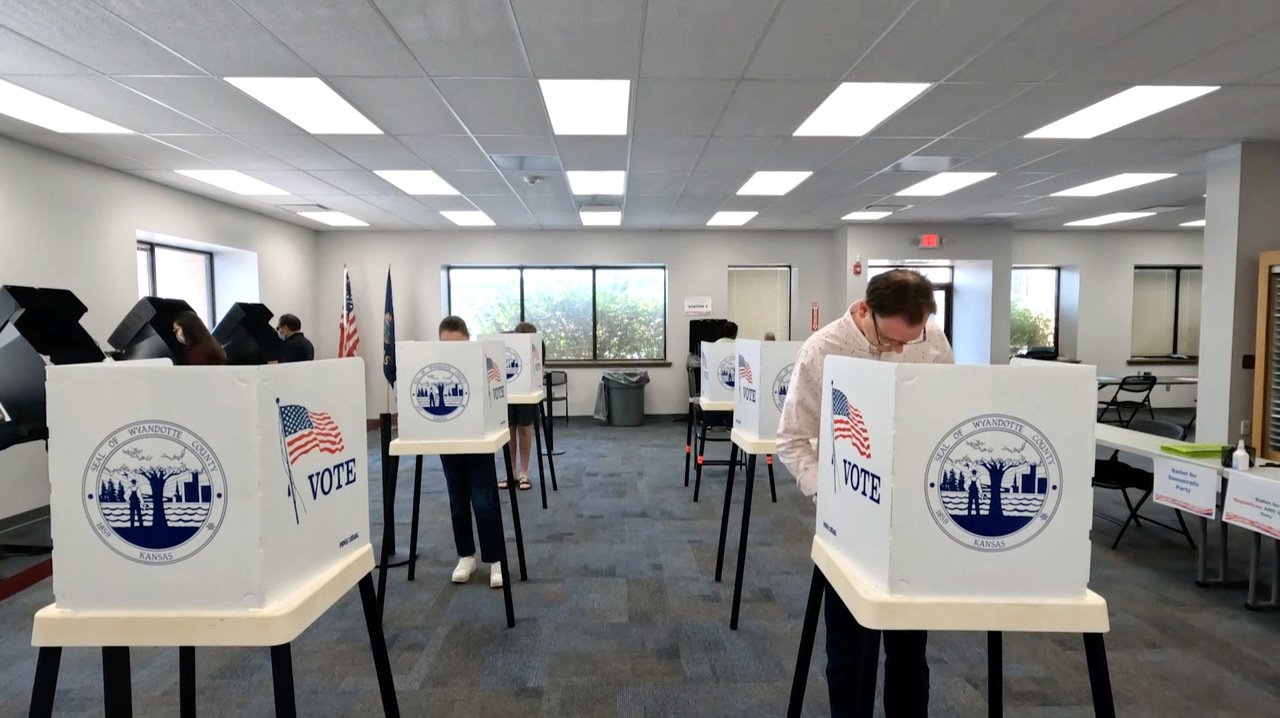Trump and Biden on Sure Path to Party Nominations
This year’s “Super Tuesday” primary elections in the U.S. strengthened the leaders in the battle for the Democratic and Republican party nominations: Joe Biden, the incumbent, and Donald Trump, who is once again seeking a second term. Underperformance in this week’s primaries in numerous states led Trump’s sole remaining challenger, Nikki Haley, to suspend her campaign. With both candidates effectively securing the nominations as early as mid-March and the transition to a head-to-head campaign that will focus on Biden’s and Trump’s rivalry will further bind American politics and anchor political decisions in the electoral context.
 David Swanson / Reuters / Forum
David Swanson / Reuters / Forum
The Course of the Primaries
On 5 March, voters in more than a dozen U.S. states cast ballots during the Democratic and Republican Party primaries on the so-called Super Tuesday. This day represents the peak of the primary cycle, after which only the most serious candidates customarily remain in contention for party nominations in the presidential elections. Despite the incumbent president seeking re-election, the Democratic Party still organised primaries per tradition, providing an opportunity for other candidates to present themselves. The primaries themselves are formally organised at the state level by the local parties, which can decide, for example, to cancel the primary in their state and transfer the support of their state’s delegates to the incumbent president, as was the case in Delaware and Florida. The most serious of Biden’s three nationwide challengers, Robert F. Kennedy Jr., announced he would run as an independent candidate. The other two, Congressman Dean Philips and motivational book author Marianne Williamson, failed to win a single delegate. For this reason, the president is not actively campaigning to win the primaries. Biden had already won every vote leading up to Super Tuesday, but in one state, Michigan, more than 100,000 participants cast “uncommitted” ballots, giving no support to any candidate. This was symbolic backlash primarily from the state’s large Arab-American minority and other opponents of the Biden administration’s approach to Israel’s war with Hamas. Such a significant number of votes (about one in seven of all votes cast in the state) left two of Michigan’s 117 Democratic Party delegates officially “uncommitted”. Before Super Tuesday, though, Biden had the support of 206 delegates.
The Republican Party’s first vote, the Iowa caucuses in January, featured five candidates. After Trump’s victory in the state, three of his challengers suspended their presidential campaigns—Florida Governor Ron DeSantis, businessman Vivek Ramaswamy (who won 9 and 3 delegates, respectively, immediately endorsed Trump), and former Arkansas Governor Asa Hutchinson. Only former South Carolina Governor Haley continued to campaign. Between Iowa and Super Tuesday, she had won only in the District of Columbia, which is not considered a very good marker of overall Republican voter sentiment, winning just 43 delegates in total. Trump had won 10 primaries, winning the support of 276 delegates. Trump had argued even before Super Tuesday that the primaries “were over” and only he could be the Republican Party’s nominee. Politicians associated with him urged “party unity” or outright called on Haley to suspend her campaign.
Super Tuesday’s Impact
The vote solidified the leaders for party nominations. Biden won in all 16 states where the Democratic Party primaries were held, but in American Samoa he lost to Jason Palmer, who is a candidate in only some states and territories. In some of the states Biden won, a significant number of voters reiterated their dissatisfaction with his candidacy or policies by casting an “uncommitted” vote, most significantly in Minnesota (18.9%), North Carolina (12.7%), and Massachusetts (9.3%). As a result, at least 11 delegates are officially “uncommitted” after Super Tuesday. Biden’s victories by a significant margin over the other candidates allowed him to win a minimum of 1,269 delegates, securing total support of at least 1,527 delegates. While this number does not yet guarantee the party nomination, it places him on a certain path to winning it. Phillips, who did not win any delegates, suspended his campaign.
In the Republican primaries on Super Tuesday, Trump won 14 of the 15 states, clearly dominating Haley by a margin of 15-70 percentage points. He secured a minimum of 758 delegate votes, which translated into a total support of no less than 1,031 delegates. Haley won only in Vermont, with a 4 percentage point advantage over Trump. Together with the results from other states where delegate votes are distributed proportionally, this ensured her at least 46 delegate votes (giving total support of at least 89 delegates). Haley’s single victory in a state that was projected as one of the most secure, and the lack of similar successes in Virginia, Minnesota, and Massachusetts, among others, is a worse-than-expected result and a disappointment for the candidate. As a result, she suspended her presidential campaign, but did not endorse Trump, instead calling on him to strive to win the votes of her constituents.
For both parties, post-Super Tuesday primaries will still be held in more than 30 states and U.S. territories. The Republican Party’s primaries in the next two weeks (up to 19 March), including in Florida, Georgia, Illinois, and Ohio, are likely to be won by Trump, securing him delegate support of at least 1,215 votes. The fate of the Democratic Party’s nomination will be decided on 12 March when votes will be taken in Georgia, Mississippi, Washington, and the Northern Mariana Islands, as well as among Democrats abroad. Biden is likely to score consecutive victories and receive enough delegate votes (at least 1,968) to receive his party’s nomination. Formally, however, the primaries will go on, and both politicians will receive their nominations during the party conventions in July (Republican) and August (Democratic) after delegates from each state cast their votes. Only then will Biden and Trump become their parties’ official presidential candidates (paired with the vice presidential candidates).
Public Sentiment Towards the Top Candidates
This year’s primaries for both parties clearly pointed to the two favourites even before the first vote, but the results do not fully reflect public sentiment. The Gallup Institute’s polling shows support for Biden remains low, currently at 38%. In a poll conducted for the New York Times, 48% of respondents named Trump as their preferred candidate, while 43% named Biden. Up to 73% supported the claim that Biden is too old to be effective as president. As for Trump, who is four years younger, only 42% of those surveyed agreed he is too old. In the same survey, a plurality of people (43%) said that Biden’s policies had hurt them personally, while 39% said they had made no difference, and 18% declared that they had been beneficial. In comparison, in response to a question about their assessment of Trump’s policies during his presidency, 40% found them helpful, 34% said they were not affected, and 25% considered them harmful. In a survey for NBC News, among voters who responded that irregular migration and border protection were major factors in their decision this election cycle, a strong majority (57%) identified Trump as the politician who would better handle a migration crisis, compared to 22% for Biden.
Conclusions and Implications
Super Tuesday strengthened Trump, effectively ending Republican opposition to his candidacy and placing him on a sure path to quickly gaining the support necessary to win the party’s nomination. The vote also nailed down the prospect of Biden quickly winning his party’s nomination, but at the same time highlighted the opposition of some voters to his candidacy, expressed as “uncommitted” votes. The actual conclusion of the two parties’ primaries in mid-March will enable both candidates to run a months-long campaign targeting the broader electorate, including independent voters, which are key to winning the November elections. Biden’s renewed rivalry with Trump was already a foregone conclusion, so one should prepare only for the consequences of a victory by one of them. However, the rapid transition to the general campaign will more sharply divide American politics, more clearly anchoring the decisions of the presidential administration and members of Congress from both parties in the electoral context (e.g., the scope of migration and border protection policy reform, support for Ukraine, decisions at the NATO summit in Washington).





.jpg)